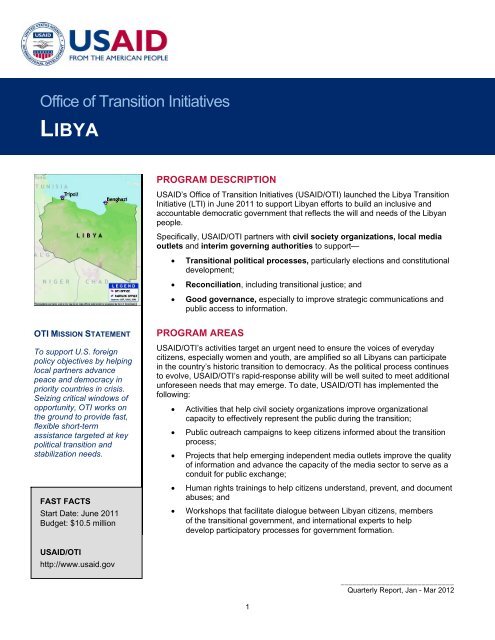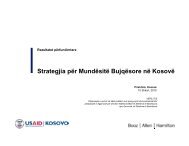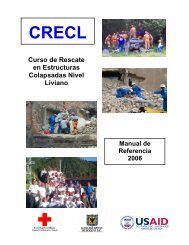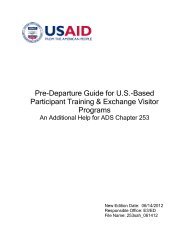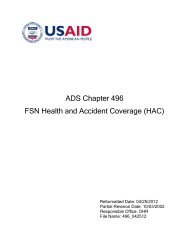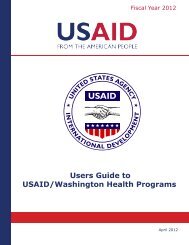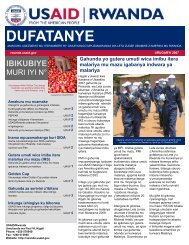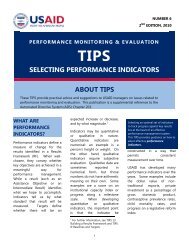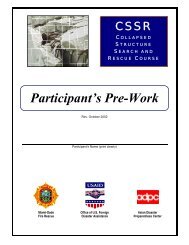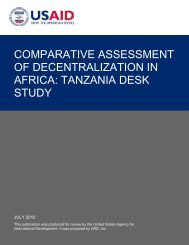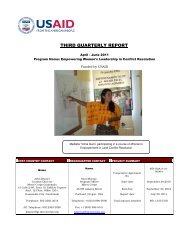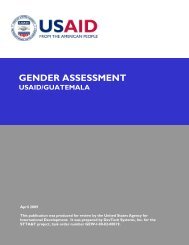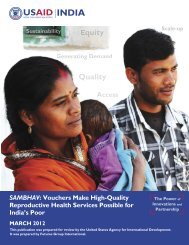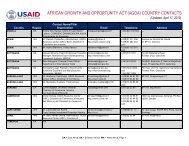USAID/OTI Libya Program Quarterly Report: January - March 2012
USAID/OTI Libya Program Quarterly Report: January - March 2012
USAID/OTI Libya Program Quarterly Report: January - March 2012
You also want an ePaper? Increase the reach of your titles
YUMPU automatically turns print PDFs into web optimized ePapers that Google loves.
Office of Transition Initiatives<br />
LIBYA<br />
<strong>OTI</strong> MISSION STATEMENT<br />
To support U.S. foreign<br />
policy objectives by helping<br />
local partners advance<br />
peace and democracy in<br />
priority countries in crisis.<br />
Seizing critical windows of<br />
opportunity, <strong>OTI</strong> works on<br />
the ground to provide fast,<br />
flexible short-term<br />
assistance targeted at key<br />
political transition and<br />
stabilization needs.<br />
FAST FACTS<br />
Start Date: June 2011<br />
Budget: $10.5 million<br />
<strong>USAID</strong>/<strong>OTI</strong><br />
http://www.usaid.gov<br />
PROGRAM DESCRIPTION<br />
<strong>USAID</strong>’s Office of Transition Initiatives (<strong>USAID</strong>/<strong>OTI</strong>) launched the <strong>Libya</strong> Transition<br />
Initiative (LTI) in June 2011 to support <strong>Libya</strong>n efforts to build an inclusive and<br />
accountable democratic government that reflects the will and needs of the <strong>Libya</strong>n<br />
people.<br />
Specifically, <strong>USAID</strong>/<strong>OTI</strong> partners with civil society organizations, local media<br />
outlets and interim governing authorities to support—<br />
• Transitional political processes, particularly elections and constitutional<br />
development;<br />
• Reconciliation, including transitional justice; and<br />
• Good governance, especially to improve strategic communications and<br />
public access to information.<br />
PROGRAM AREAS<br />
<strong>USAID</strong>/<strong>OTI</strong>’s activities target an urgent need to ensure the voices of everyday<br />
citizens, especially women and youth, are amplified so all <strong>Libya</strong>ns can participate<br />
in the country’s historic transition to democracy. As the political process continues<br />
to evolve, <strong>USAID</strong>/<strong>OTI</strong>’s rapid-response ability will be well suited to meet additional<br />
unforeseen needs that may emerge. To date, <strong>USAID</strong>/<strong>OTI</strong> has implemented the<br />
following:<br />
• Activities that help civil society organizations improve organizational<br />
capacity to effectively represent the public during the transition;<br />
• Public outreach campaigns to keep citizens informed about the transition<br />
process;<br />
• Projects that help emerging independent media outlets improve the quality<br />
of information and advance the capacity of the media sector to serve as a<br />
conduit for public exchange;<br />
• Human rights trainings to help citizens understand, prevent, and document<br />
abuses; and<br />
• Workshops that facilitate dialogue between <strong>Libya</strong>n citizens, members<br />
of the transitional government, and international experts to help<br />
develop participatory processes for government formation.<br />
1<br />
____________________________<br />
<strong>Quarterly</strong> <strong>Report</strong>, Jan - Mar <strong>2012</strong>
COUNTRY SITUATION<br />
In early 2011, inspired by the Arab world uprisings against oppressive regimes, peaceful protests erupted in<br />
Benghazi calling for the end to Muammar Qadhafi’s 42 years of unchallenged authoritarianism. Qadhafi’s attempts<br />
to violently suppress these peaceful protests in February 2011 sparked an armed rebellion backed by political and<br />
military defections across the country. The rebellion in Benghazi soon motivated other regions to unite in ad hoc<br />
militias to challenge the Qadhafi regime. By October, these bands of revolutionaries achieved their objective with<br />
the capture and death of Qadhafi outside his hometown of Sirte. With the revolutionaries’ common enemy gone, the<br />
people of <strong>Libya</strong> are developing a common vision for their future, nominally led by the self-appointed National<br />
Transitional Council (NTC) that is exercising a legislative function and serving as the Government of <strong>Libya</strong>.<br />
October 23, 2011, Liberation Day, marked the beginning of a 20-month roadmap outlined in the Constitutional<br />
Charter, which delineated processes for elections, drafting a new constitution, and electing a permanent government.<br />
The first elections, scheduled for June <strong>2012</strong>, present a formidable logistical challenge in a country that has<br />
not held any form of election for nearly 50 years. While the United Nations, European Union, United States, and<br />
other bilateral donors are able to offer support for the management and administration of the elections, <strong>USAID</strong>/<strong>OTI</strong><br />
is uniquely positioned to support civic education of private citizens, the media, and civil society in an emerging<br />
democracy, as well as provide support for election outreach. The subsequent phases of the transition will likewise<br />
present unique challenges for a country dominated for 42 years by Qadhafi and his cult of personality. <strong>USAID</strong>/<strong>OTI</strong><br />
will be positioned to quickly and flexibly respond to unforeseen needs as democratic institutions begin to take hold.<br />
The security situation in <strong>Libya</strong> remains one of the biggest challenges facing the new government. There is currently<br />
no effective police or military force controlled by the government. Various militias occupy this security vacuum and<br />
control the areas liberated from Qadhafi. Skirmishes are common along disputed lines of control and between<br />
militias from different tribes or ethnic groups that have historical grievances. These disputes, along with the psychosocial<br />
scars from years of autocratic oppression and the recent revolution, make reconciliation and transitional<br />
justice an immediate priority to ensure that the spirit of unity and democracy prevail.<br />
Addressing these issues and building a free and peaceful future for the <strong>Libya</strong>n people will require close<br />
collaboration between the government and <strong>Libya</strong>’s many diverse communities. Consequently, the government must<br />
improve accountability, transparency, and public engagement to ensure it has the trust and legitimacy to lead the<br />
nation forward in the spirit of unity and compromise.<br />
UPCOMING EVENTS<br />
June <strong>2012</strong> -<br />
Late 2013 -<br />
GRANTS SUMMARY<br />
Scheduled first round of elections for a National Council to replace the NTC and select a<br />
Constitutional Committee to draft a new constitution<br />
New constitution ratified by the public and elections scheduled for a permanent<br />
government<br />
Since June 2011, <strong>USAID</strong>/<strong>OTI</strong>, through its implementing partners Chemonics, Development Alternatives<br />
International, and Mercy Corps, has cleared 36 activities totaling $1,399,228. Funding breaks down by sector as<br />
illustrated in the chart below:<br />
2<br />
____________________________<br />
<strong>Quarterly</strong> <strong>Report</strong>, Jan - Mar <strong>2012</strong>
ACTIVITIES<br />
Supporting Public Outreach in Tripoli – In <strong>March</strong>, the Tripoli<br />
Free Media Center officially opened its doors to civil society<br />
organizations and media outlets. The Center’s objective is to<br />
improve public communications to facilitate citizen awareness<br />
and engage in political processes transforming <strong>Libya</strong> into a free<br />
and democratic nation. The U.S. Ambassador, a delegation of<br />
U.S. Congressmen led by David Drier and David Price, officials<br />
from the Government of <strong>Libya</strong>, and civil society leaders attended<br />
the opening ceremony. The grant from <strong>USAID</strong>/<strong>OTI</strong> provides the<br />
Center with technical assistance to facilitate trainings and<br />
workshops as well as material assistance such as equipment and<br />
a physical space for civil society and media groups to interact,<br />
access resources, and develop outreach campaigns.<br />
Preparing the Next Generation of Journalists in Benghazi –<br />
In October, U.S. Special Envoy Chris Stevens and NTC Deputy<br />
Chairman Abdel Hafiz Ghoga attended a certificate ceremony for<br />
47 emerging <strong>Libya</strong>n journalists who completed a <strong>USAID</strong>-supported training on freedoms and limitations of media in<br />
democracies. The workshop presented other countries’ laws, legal case studies, and experts’ experiences to help<br />
participants think about which freedoms they want protected in <strong>Libya</strong>’s future constitution. Stevens and Ghoga<br />
distributed certificates to a youthful and motivated group who provided journalism coverage during the revolution<br />
through local print, radio, television, and the Internet. The workshop was facilitated by an international journalist and<br />
featured guest speakers from both <strong>Libya</strong> and abroad, including NTC members, a Reuter’s journalist, and a <strong>Libya</strong>n<br />
journalist who spoke about his experience writing before the revolution and his current perspective following his<br />
recent release from prison. This activity brought together individuals to form an associated group in an effort to<br />
promote an independent <strong>Libya</strong>n media.<br />
Educating the <strong>Libya</strong>n Public about the Roadmap to<br />
Democracy – Since November, <strong>USAID</strong>/<strong>OTI</strong> has partnered with<br />
youth organization H2O to raise public awareness about the<br />
transitional government’s roadmap to democracy in <strong>Libya</strong>. The<br />
group incorporates graphics into outreach materials that concisely<br />
explain the transition process with T-shirts, billboards, and<br />
pamphlets supported by <strong>USAID</strong>/<strong>OTI</strong>. To support the group’s<br />
outreach, <strong>USAID</strong>/<strong>OTI</strong> provided a strategic communications expert to<br />
help the organization develop an effective outreach plan for public<br />
messaging. In addition to producing the materials, dozens of young<br />
volunteers from H2O canvassed citizens on the streets to educate<br />
them about the government’s transition plan.<br />
<strong>Libya</strong>ns Prepare to Draft the Country’s First Constitution in<br />
Nearly 50 Years – In December, <strong>USAID</strong>/<strong>OTI</strong> partnered with local<br />
women’s organization Attawasul to host a three-day constitution-<br />
3<br />
Members of the U.S. Congress attended the<br />
Free Media Center opening in Tripoli.<br />
Women from H2O explain the transition process<br />
to students.<br />
making workshop to begin a dialogue between <strong>Libya</strong>n groups about the issues the nation will face in putting<br />
together the first constitution the country has seen in nearly 50 years. Representatives from government, civil<br />
society, and the media attended the workshop both to learn about constitution making with experts from the U.S.<br />
Institute for Peace (USIP) and to begin discussing how the <strong>Libya</strong>n public will feed into a constitution-making<br />
process that is participatory, inclusive, and transparent in order to ultimately generate the support needed to<br />
achieve ratification.<br />
____________________________<br />
<strong>Quarterly</strong> <strong>Report</strong>, Jan - Mar <strong>2012</strong>
CONTACT INFORMATION<br />
Shane Perkinson<br />
<strong>Program</strong> Manager<br />
<strong>OTI</strong> Asia & Middle East<br />
Tel: (202) 712-0817<br />
E-mail: sperkinson@usaid.gov<br />
Civil Society Goes Public for the First Time – Through a grant to Mercy<br />
Corps and in coordination with the NTC Executive Office of Culture and Civil<br />
Society, <strong>USAID</strong>/<strong>OTI</strong> helped a local organization, Hamzat Wasl, establish a Civil<br />
Society Resource and Learning Center in Benghazi. In October, <strong>USAID</strong>/<strong>OTI</strong><br />
helped celebrate the grand opening of the center with a small grant to fund<br />
materials and services for a full day of events, including an open house for civil<br />
society representatives in the morning, a ribbon cutting ceremony and<br />
reception, a panel discussion, networking activities, and a formal introduction to<br />
the services offered by the Center. Attendees included representatives from the<br />
U.S. Mission to <strong>Libya</strong>, the NTC, international non-governmental organization<br />
stakeholders, and more than 30 civil society organizations based in and around<br />
Benghazi, the birthplace of the February 17 revolution. The event generated<br />
attention for the Center and gave a broad cross section of <strong>Libya</strong>n civil society<br />
the opportunity to make connections, recruit members, identify opportunities for<br />
collaboration, and learn about the ways that organizations can contribute to<br />
<strong>Libya</strong>’s changing political and cultural landscape. For nascent organizations,<br />
the event provided an opportunity to explore resources at the Center that may<br />
prove essential for official registration, adoption of governing principles and a<br />
statement of mission, as well as building management capacity and<br />
sustainability.<br />
PROGRAM EVALUATION<br />
In <strong>January</strong>, <strong>USAID</strong>/<strong>OTI</strong> held a strategic review session with Washington, D.C.-<br />
and <strong>Libya</strong>n-based staff from <strong>OTI</strong> and Chemonics, the current implementing<br />
partner for the LTI. The review session provided an opportunity to analyze the<br />
political situation and helped program staff identify the most critical needs to<br />
support the <strong>Libya</strong>n transition. During the multi-day meeting, <strong>USAID</strong>/<strong>OTI</strong> further<br />
developed the previously outlined program objectives to ensure the <strong>Libya</strong>n<br />
people have effective support for the transition.<br />
Additionally, <strong>USAID</strong>/<strong>OTI</strong> and Chemonics have developed a monitoring and<br />
evaluation manual to ensure that best practices in program appraisal are<br />
applied in each activity undertaken. Examples of monitoring and evaluation<br />
tools over the program’s diverse set of activities include documenting events,<br />
interviewing recipients of trainings, surveying workshop participants, and<br />
conducting regular site visits.<br />
In May, <strong>USAID</strong>/<strong>OTI</strong> and Chemonics will send Washington, D.C.-based staff to<br />
<strong>Libya</strong> to evaluate the management systems of the program and ensure<br />
operations and communications are effective and efficient. This management<br />
review is one tool <strong>USAID</strong>/<strong>OTI</strong> uses to ensure the program realizes maximum<br />
impact with the limited resources available.<br />
4<br />
____________________________<br />
<strong>Quarterly</strong> <strong>Report</strong>, Jan - Mar <strong>2012</strong>


